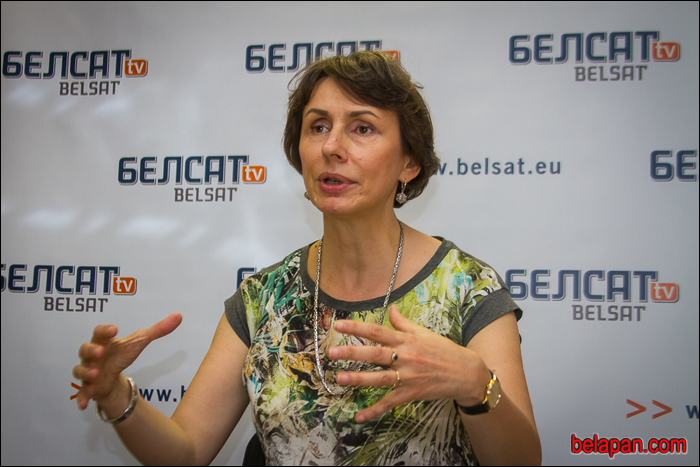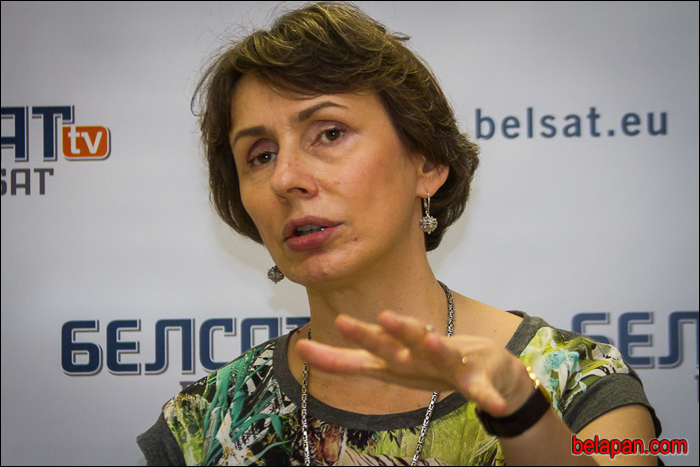Belsat Director in a Public Meeting at Press Club in Minsk
“Minsk is changing a lot, and there is a drastic difference between the capital and the province” this is how Agnieszka Romaszewska-Guzy formulated her fresh impressions from Belarus. It is the second time in the decade that Mrs Romaszewska visits Belarus: after she was deported in 2005, for ten years she had been denied a visa to Belarus.
On May 31, the Press Club Belarus held a public meeting with Belsat director, after she made a trip to the north of the country and before another trip to southern regions. She told about nowadays Belsat, their expectations, and answered the questions of the public.
“I was assured there would be no cut-downs in financing from the Polish side”
Belsat has been broadcasting for nine years, and Mrs Romaszewska believes it to be the main success.
But the situation with the “thaw” in relations with Belarus, on the one hand, opens up opportunities, but on the other hand, creates some problematic issues.
“There are now less repressions against journalists. Our reporters can get to majority of places, even though they have no accreditation. On the other hand, our sponsors who fund us are now getting away from Belarus. They consider that the situation is improving, and Europe has many other problems. We’ve lost a significant part of financing from Western Europe. Meanwhile, I was assured that there would be no cut-downs from the Polish side. In our ninth year of work, it would have been a waste of already invested money…»
“If somebody wants to stop us here, we will keep working from Poland.”
“Belsat is now broadcasting through two channels – the satellite channel and the Internet. Satellite programs are more aimed for the province, and the Internet is more aimed for Minsk and large cities. We are not going to abandon satellite broadcasting, but now we put higher stakes on developing the website.
We pursue two tasks: the first one being information and the second one is large programs. And we are planning to record more programs in Minsk. For the time being, the main work is done here, in Poland we only assemble it into a seamless set. But if somebody wants to stop us here, we will keep working from Poland. It is essential that it is a joint Belarus-Poland project. Everyone is doing their part. I deal with shaping the general line, whereas my colleagues decide what it will look like specifically…
The channel’s management are expecting the Belarus Foreign Affairs’ Ministry to respond to our request to accredit ten of our journalists in the territory of Belarus. The requests have been lodged since 2008, every time it was in vain. “I am prone to think that this time there will be a refusal, too. But let’s see, I will not prophet.”
“Why the authorities deny accreditation? I don’t know the answer. It stems from the nature of these authorities. I don’t see any use in it for them. But sometimes they like to do so. I don’t think, though, that with accreditation our work will get easier. Even if we get the accreditation, we won’t become “Russia Today.”

Has Belsat something to do to counter Russian propaganda?
“We are considering all the time a possibility to create Russian-language programs. But first, I have to get my colleagues’ consent, and second, I have to find financing for this. Opinions regarding the language issues has split into two opposites. One side thinks that the Belarusian language is our trademark, the other side believes that the Russian language would allow to engage larger audiences.
I stick to the latter. The question of the Russian language is the question of our effectiveness. Our signal reaches as far as the Urals; we could be watched even in the Crimea. The ideal variant could be twins: one channel is a normal Belsat for Belarus, and the second channel is aimed for the Russian audiences.
Belsat does not follow a political line, but sticks to two principles. The first principle is that Belarus is a part of Western Europe and Western civilization. The second principle is that Communism is a criminal regime. These are our basic, undisputable views of contemporary reality.
“Freelancers are largest concern”
“I am going to meet Kastus Zhukouski, the Homel-based freelancer who is now the champion in the number of fines for work without accreditation. However, by doing this, I can only show that I am concerned with the issue,” she admits. “Freelancers are our largest concern. What should we do when the authorities chose to pressurize individual journalists?
One of the first questions from our colleagues who came to be employed by Belsat was: “Can you guarantee our safety?” And I answered no, I could not, unfortunately. This is your responsibility, if you want to take the risk or not.
I know that BAJ helps, and we are very grateful. It would have been very difficult without it. We have no any specific ideas how to solve the issue. We can always say: when you’ve had enough of it, come to Poland, take a little break. But it is very hard to change the situation. We can only promise that we won’t leave the person alone. Even if BAJ does not help, we won’t forget about these people.”
 @bajmedia
@bajmedia

